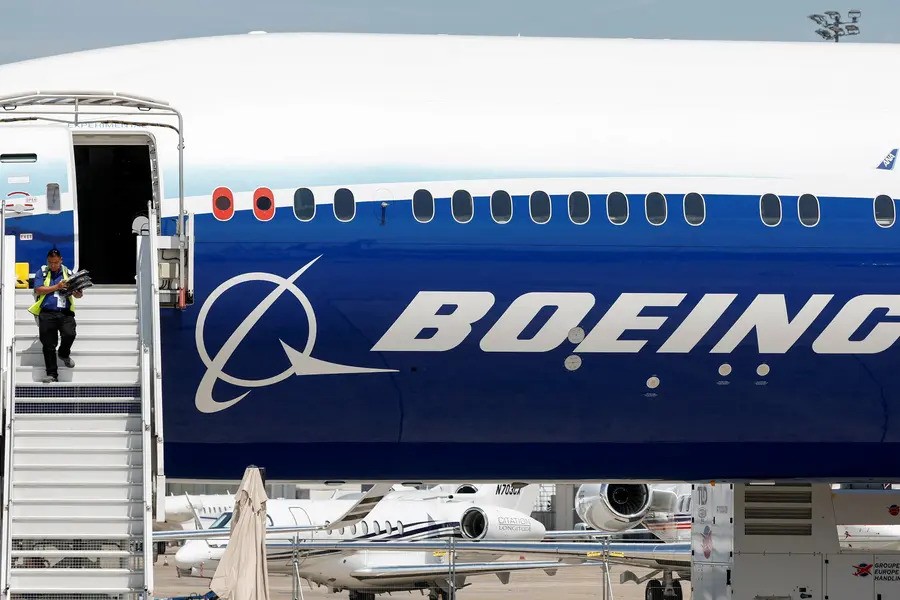Boeing and the union representing its striking machinists have reached a new contract proposal that could potentially end a month-long strike that has disrupted the company’s aircraft production. The International Association of Machinists and Aerospace Workers (IAM), which represents about 33,000 Boeing workers, announced on Saturday that a ratification vote will be held on Wednesday, allowing members to decide on the latest offer.
The new proposal includes a 35% wage increase spread over four years, an improvement from the 30% raise that was initially rejected last month. Additionally, the agreement boosts the signing bonus to $7,000 per worker, up from the previous $6,000. However, a key issue remains unresolved: the new offer does not restore the traditional pension plan, a major demand of the striking workers. Instead, Boeing has proposed increasing its contributions to workers’ 401(k) plans, enhancing the company’s match to support employee retirement.
Boeing expressed optimism about the upcoming vote, stating, “We look forward to our employees voting on the negotiated proposal.” The company’s leadership is hoping the improved terms will be enough to bring an end to the walkout, which began on September 14 and has halted production of several critical aircraft models, including the 737, 737 Max, 767, and 777. While production of the 787 Dreamliner has continued at Boeing’s nonunion facility in South Carolina, the disruption has cost Boeing an estimated $1 billion per month, according to an S&P Global report.
The involvement of Acting U.S. Secretary of Labor Julie Su played a significant role in advancing the negotiations. Earlier this week, she met with both parties to help facilitate the talks, leading to a revised contract proposal. “With the help of Acting U.S. Secretary of Labor Julie Su, we have received a negotiated proposal and resolution to end the strike,” said IAM District 751 in a statement. “It warrants presenting to the members and is worthy of their consideration.”
The labor dispute began when more than 30,000 machinists overwhelmingly rejected a tentative agreement that offered a 25% wage increase over four years. Workers cited inadequate wage hikes and unsatisfactory retirement benefits as reasons for rejecting the initial deal. Boeing later made a sweeter offer, but it was criticized by the union for not being adequately negotiated, which led to the strike. The current proposal represents the latest attempt to bridge the gap, addressing wage concerns and increasing bonuses, though it still falls short of restoring the pension plan.
The timing of the vote is critical, as Boeing plans to release its quarterly earnings on Wednesday, the same day as the ratification vote. The company has already indicated it will report a significant loss and take a $5 billion charge across its commercial and defense units, a reflection of the financial strain the strike has contributed to. Boeing has been dealing with numerous issues this year, including a safety crisis linked to a door plug blowout on a 737 Max and challenges across other programs. A successful vote to ratify the new contract would allow the company to resume production on its key aircraft models and begin to stabilize its finances.
The current labor dispute has marked a challenging period for new CEO Kelly Ortberg, who took over in August. Ortberg’s mandate has been to steer Boeing through financial difficulties, address production issues, and restore confidence in the company’s leadership. Earlier this month, he announced plans to cut 10% of Boeing’s global workforce, a reduction of around 17,000 employees, citing the need to control costs amid the ongoing strike. Additionally, Boeing has decided to cease production of the 767 once existing orders are fulfilled in 2027, marking a shift in its long-term production strategy.
As the vote approaches, union members will have to weigh the benefits of the proposed wage increases, higher bonuses, and enhanced 401(k) contributions against the continued lack of a traditional pension plan. For Boeing, a ratified contract would not only signal an end to the strike but also represent a crucial step toward stabilizing its production lines and financial outlook. The outcome will be closely watched as it could mark a turning point for the aerospace giant after a year of setbacks.
If the contract is approved, it will be a significant victory for both Boeing’s management and the union, potentially setting the stage for improved relations moving forward. If it is rejected, the strike will likely continue, further straining Boeing’s finances and compounding its existing challenges. Either way, the decision on Wednesday will be pivotal in determining the immediate future of Boeing’s operations and its efforts to regain stability in a difficult year.

